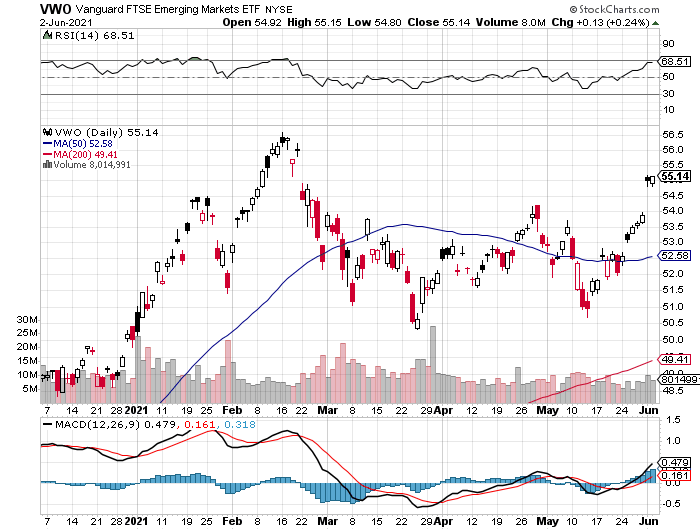They’re alive! They’re alive! Emerging markets stocks are alive! Or so it seems.
After languishing in a trading range for weeks, Vanguard FTSE Emerging Markets Index Fund ETF Shares (NYSE:VWO) surged in the past two days, ending Wednesday's session (June 2) at the highest level since February.
Is it risk-on for EM?
It’s certainly getting easier to lean in that direction. But before we give the green light to the idea, let’s consider what’s changed. In particular, why did EM suddenly go ballistic?
Answering such questions is always fraught with danger since Mr. Market never does press conferences. But caveats aside, one can reasonably surmise that shifting views on the outlook for interest rates is a factor.
Recall that in recent months the crowd has become increasingly focused on inflation risk. In turn, that implies that interest rates are set to rise. Traders, of course, have been playing that song for months—until it went flat a few weeks back.
The benchmark 10-year Treasury yield, after rising steadily since last summer through March, has been going nowhere fast over the past two months, churning around the roughly 1.6% mark.
The bond market, it appears, seems to be embracing the “inflation-is-transitory” narrative that the Federal Reserve is promoting. Right or wrong, the narrative is resonating, and it seems the EM trade is climbing on board.
Why? The IMF explains that:
“When news about higher US inflation drives US interest rates up, this also tends to be benign for emerging markets. Their interest rates, exchange rates and capital flows tend to be unaffected, probably because past inflation surprises have reflected a mix of good economic news, like a higher willingness to spend, and bad news, like higher costs of producing.”
So, why was EM on the defensive earlier in the year, when the threat of higher rates looked more convincing? The answer, the IMF says, is tightly linked with why rates are rising.
The higher-inflation outlook implies a higher risk of “surprise” monetary tightening (as opposed to raising rates because economic growth is strengthening), and that makes all the difference, according to the IMF:
"When, however, a rise in advanced economy interest rates is driven by expectations of more hawkish central bank actions, it can harm emerging market economies. Our study captures these “monetary policy surprises” as increases in interest rates on days of regular Federal Open Market Committee or European Central Bank Governing Council announcements.
"We find that each percentage point rise in US interest rates due to a “monetary policy surprise” tends immediately to lift long-term interest rates by a third of a percentage point in the average emerging market, or two-thirds of a percentage point in one with a lower, speculative grade credit rating. All else equal, portfolio capital immediately flows out of emerging markets and their currencies depreciate against the US dollar.
"A key difference relative to interest rate increases driven by good economic news is that the “term-premium”—compensation for the risks of holding longer-maturity debt—goes up in the US with hawkish monetary policy surprises, and with it, spreads on dollar-denominated emerging market debt."
The pushback on assuming that it’s clear sailing for EM from here on out: the inflation debate is still in its early innings. Deciding if the recent jump in inflation is transitory or set to endure at a higher level won’t be known for months at the earliest. Meanwhile, the EM bulls seem to have the upper hand once more.
One reason is that the rate-hike forecasts went a bit too far, which opened the door for a rebound in EM. As Bloomberg reports, “In markets from South Africa to Mexico and South Korea, traders are penciling in a faster pace of interest-rate hikes than what economists say is currently warranted based on the inflation outlook.”
But Shamaila Khan, head of emerging-market debt at AllianceBernstein, advises that “almost all of them are overpricing tightening.”
Which stock should you buy in your very next trade?
With valuations skyrocketing in 2024, many investors are uneasy putting more money into stocks. Unsure where to invest next? Get access to our proven portfolios and discover high-potential opportunities.
In 2024 alone, ProPicks AI identified 2 stocks that surged over 150%, 4 additional stocks that leaped over 30%, and 3 more that climbed over 25%. That's an impressive track record.
With portfolios tailored for Dow stocks, S&P stocks, Tech stocks, and Mid Cap stocks, you can explore various wealth-building strategies.

